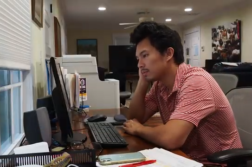ORLANDO, FL (Ivanhoe Newswire) — The impact of COVID-19 on children’s education was drastic and it is important to keep their minds moving during the holiday break.
We are still recovering from the effects of COVID-19. New federal data reveals that ACT test scores dropped to their lowest point in 30 years. Nine-year-old’s reading and math scores have also taken a dramatic hit. It is important as we head into the holiday break, parents focus on ways to keep their children learning.
COVID-19 put the brakes kids’ brains. A new report from the national center of education reveals the first score decline in reading since 1990 and the first ever score decline in math. That’s why it’s imperative to keep kids learning all year ‘round. First, explore opportunities to learn online.
“We don’t have to shy away from it because you do have to find different apps that you can use to further your kids’ interests,” says co-author of “School is About More than Just ABC’s,” Marie Miller.
Some of the top-rated educational apps for elementary school-aged kids are ABCmouse, Khan Academy, Epic! And Quick Math Jr. Many podcasts include extra learning materials. Some of the most popular are Radiolabs Terrestrials, But Why: A Podcast for Curious Kids, and Tumble.
Not all learning needs to be hi-tech though. Studies show that physically reading with your child six to seven days a week has the effect of being 12 months older. Not only will it increase their vocabulary, but it makes them better problem solvers and increases their cognitive skills.
Lastly, get out and about. Join nature groups, science centers, and your local library. Facebook can connect parents and kids to specialty groups in your area focused on everything from robotics to languages.
“Give them time to be a kid and to play outside,” says Co-author of “School is About More than Just ABC’s,” Heather Agee.
Another way to keep them learning is by creating a scavenger hunt. Pick prizes, set goals, and think of festive clues, experiences, and research that your kids can complete over their holiday break.
Sources:
https://blog.edmentum.com/five-tips-keep-your-child-learning-over-holidays
https://www.goodhousekeeping.com/electronics/g28212386/best-apps-for-kids/
https://www.verywellfamily.com/best-educational-apps-for-kids-4842950
https://www.education.vic.gov.au/documents/about/research/readtoyoungchild.pdf
Contributors to this news report include: Marsha Lewis, Producer; Roque Correa, Videographer and Editor.
To receive a free weekly email on Smart Living from Ivanhoe, sign up at: http://www.ivanhoe.com/ftk



